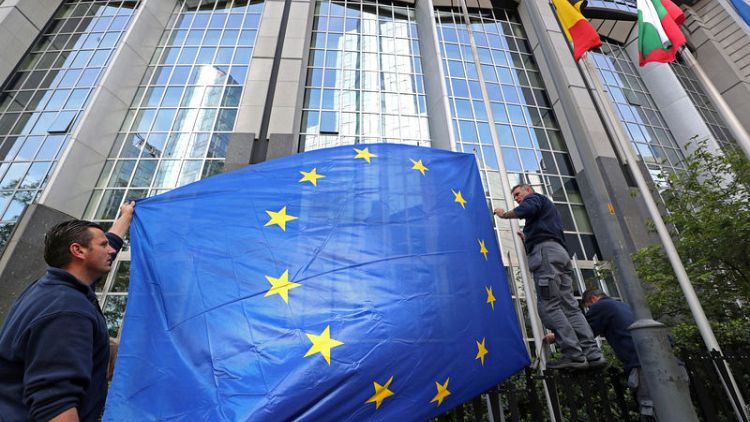By Tommy Wilkes
LONDON (Reuters) - Investors are on edge on the eve of elections to the European Parliament as they weigh the chances of eurosceptic groups grabbing a third of seats, a level at which analysts say they could stir more trouble for governments and the economy.
The rise of populist, eurosceptic parties has thrust the European elections, normally a dull affair mostly ignored by global markets, to the forefront of portfolio managers' list of concerns.
A strong showing by such groups would complicate the outlook for passing crucial European legislation and could hamper efforts by EU governments to present a united front in the event of a global trade war.
Populist parties have also called for an easing of euro zone fiscal rules and investors are particularly worried about Italy, where a good result for Deputy Prime Minister Matteo Salvini's far-right League could embolden him to take a tougher stance in a spat with Brussels over budget spending.
"It's clear that eurosceptics are going to get more votes than they have before," said John Taylor, co-head of European fixed income at investment firm AllianceBernstein.
"[If they can get a third of votes] they might become a very disruptive influence when you need Europe to come together to fight things like a trade war."
Opinion polls consistently predict that an alliance of pro-EU conservative, socialist and liberal parties will win an absolute majority. But they predict the eurosceptics' share of seats will rise significantly from the current 10%.
Berenberg investment bank said opinion polls suggested eurosceptic parties may win about 180 seats in the 751-seat Parliament in the elections, which begin on Thursday, with results due out on Sunday.
That would total less than 25% of seats, an amount the bank said was insufficient to disrupt governance.
For a graphic on European election, see - https://tmsnrt.rs/2EdJ1W2
"The EU elections could inject political risk into sovereign bond markets in the short and medium term, making the election results a 'must-watch' event for fixed-income investors, perhaps for the first time," analysts at fund manager Fidelity told clients.
Pre-election nervousness, along with the China-U.S. trade tensions and Britain's Brexit stalemate, have already sent investors scurrying for the safety of government bonds, pushing German 10-year bond yields to 2-1/2-year lows.
ITALY
Far-right leaders share the broad ideological goals of curbing the EU's perceived liberal course and returning power to national capitals. Many also want to loosen euro zone fiscal rules that limit how much they can spend.
In Italy, the election outcome could have implications not only for Rome's budget battles with the European Commission but could also lead to a national election if Salvini decides to ditch his coalition partner and go it alone.
Taylor said the euro and Italian bond yields would suffer most if eurosceptic parties won an increased share of seats in the European Parliament, especially if they managed to bag a third of them.
Investors believe such an outcome could send Italian bonds' yield premium over German debt to the 300 basis-point level, a level not seen since last November. The spread currently is 270 bps.
For a graphic on Slowing economy adds to widening Italian spread, see - https://tmsnrt.rs/2WIX7pk
Salvini's party has sought to take the lead in galvanising growing anti-EU sentiment among voters fed up with immigration, high unemployment and European fiscal constraints.
Rome has argued with Brussels over its budget plans. Salvini's renewed threat recently to break the 3% budget deficit cap mandated by the EU triggered a selloff in Italian bonds.
"If he gets emboldened, the question is how much tension he creates with the EU," Salman Ahmed, chief global strategist at Lombard Odier Investment Management.
SILVER LINING?
In the current parliament, the centre-right European People's Party (EPP) has 217 seats, ensuring an establishment majority by often cooperating with the centre-left Socialists and Democrats.
This week's elections are unlikely to see eurosceptic parties mustering anything near to a majority of seats. And Britain's impending departure from the EU would remove its Brexit Party -- currently leading in opinion polls -- from the EU parliament, further weakening the eurosceptics' presence.
Some analysts see some economic benefit from a populist wave if it encourages mainstream governing parties - after years of austerity - to relax budget spending, which could neutralise voters' concerns about weak growth and stagnating incomes.
Alliance Bernstein's Taylor described fiscal expansion as the "last game in town" and "somewhat of a necessity" to revive growth in the euro zone.
(Additional reporting by Sujata Rao and Dhara Ranasinghe; Editing by Gareth Jones)



